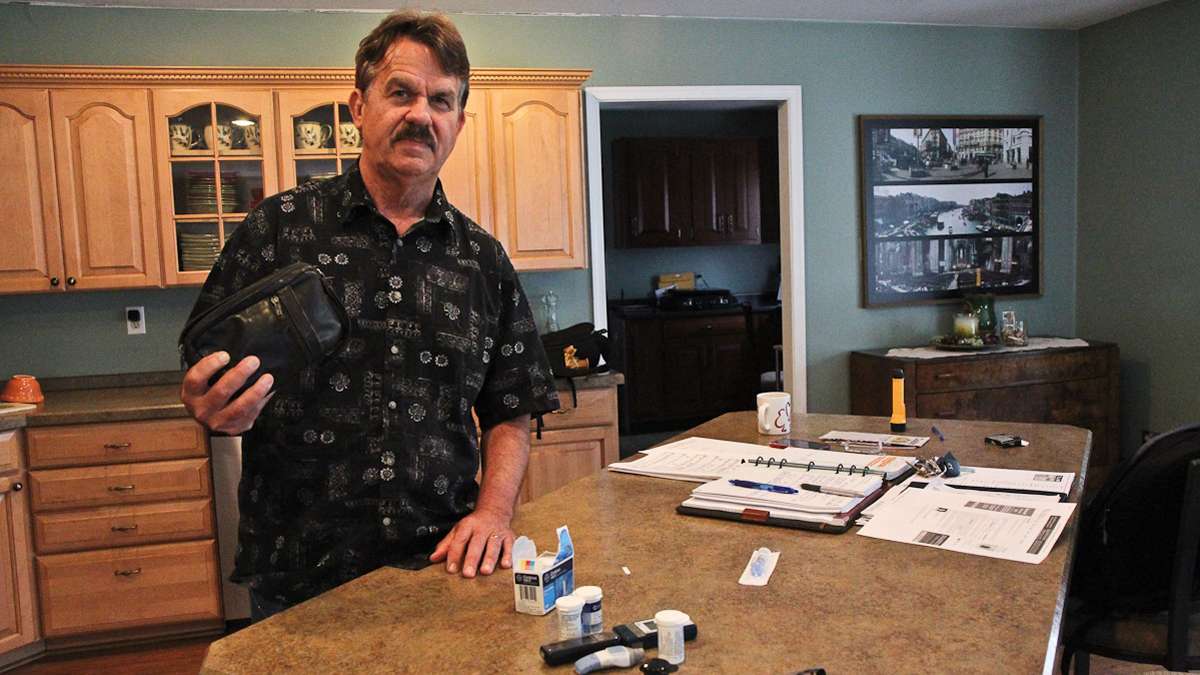Managing my diabetes is not an obsession, a distraction, or something to be tolerated

Randy Childress says management at his last job had a hard time understanding that he needed to take time during the work day to have snacks and inject insulin. (Kimberly Paynter/WHYY)
The interesting aspect of my life with diabetes is that of trying to remove it from my obsession every day.
I have been a diabetic for many years, and I have had the privilege of meeting persons with diabetes from all around the world and witnessing the variety of ways that they deal with it, from muddling through their day to being obsessive-compulsive about it’s control. One diabetic whom I met one year at the New York Marathon ate the same thing every day and took his “BG” every two hours and logged it into a program on his laptop. Most of his day was consumed by maintaining his correct glucose levels.
In my life experience I have been part of support groups with many people from a variety of occupations — lawyers, doctors, policemen, teachers, salesman, engineers — and they have to press on through periods of denial. Everyday life is to stabilize, eat, exercise, test, cover for blood glucose highs and lows, stabilize, test, check … and there are many stories about taking the day off because it can really be a nuisance.
It’s not a burden; it’s my life
I was excited about doing the interview with WHYY to at least have people recognize where discrimination for an illness can take place. I am not one to advertise my diabetes and would rather keep it invisible at the job — which requires me to be increasingly proactive to know where my blood glucose is at all times and discern what steps that I must take to keep it in a normal range.
However, the interview, after it settled into my brain, seemed to perpetuate the negative aspects of the extra steps that a diabetic takes in the course of his day to conduct himself safely and do his job normally. The preventive steps that were touched upon in the interview are all things that I do through the day to maintain normal function to keep my blood sugar levels in the range of everyone else doing their work to the best of their abilities.
The interview seemed to concur that these preventive activities took away from someone’s productive work day, which they do not. The real point is that many people in the workplace do other things during their day that are more obstructive and that impose unproductive delays to their efficiency. The dealership that I worked at allowed people to take random smoke breaks, which vacated their desks and put them out on the lot and disconnected from their work for a period of time that I never came close to wasting.
The conclusion of my interview should have been slanted toward the positive, in that I merely ingested a snack with one hand while I went through a list of potential buyers from my call list with the other. It took almost no time to take my blood sugar test to get a number that let me know that I was on course for a normal-range sugar. My pump therapy merely infuses my insulin more like a normal pancreas and keeps energy levels and blood sugars well within the normal ranges.
Everyone with diabetes, heart conditions, asthma, etc.,. has to operate responsibly and take care of their ability to perform their tasks with proper care and intake of their medicines, activities, everyday practices, so as to maximize their performance. It is probably a little more work than just rolling out of bed and adjusting your tie in the car mirror as you expedite yourself to work, but with planning and preventive measures to take care of yourself, one does not need to be discriminated because his malady gets a bad name.
I do work hard. And I work equally as hard to not let the fact that I have diabetes create an expectation of tolerance in the workplace — or keep me from being a welcomed team player on anyone’s staff.
—
Randy Childress lives in Glen Mills, Pennsylvania. In a story for WHYY’s The Pulse, he says he faced ridicule when he tried to manage his type 1 diabetes on the job.
WHYY is your source for fact-based, in-depth journalism and information. As a nonprofit organization, we rely on financial support from readers like you. Please give today.

